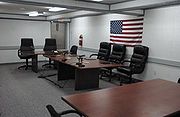
Abdullah Mohammad Khan
Encyclopedia
Transcript
Khan chose to participate in his Combatant Status Review Tribunal.On March 3, 2006, in response to a court order
Court order
A court order is an official proclamation by a judge that defines the legal relationships between the parties to a hearing, a trial, an appeal or other court proceedings. Such ruling requires or authorizes the carrying out of certain steps by one or more parties to a case...
from Jed Rakoff the Department of Defense
United States Department of Defense
The United States Department of Defense is the U.S...
published an eight page summarized transcript from his Combatant Status Review Tribunal.
Mentioned in the "No-hearing hearings" study
According to the study entitled, No-hearing hearingsNo-hearing hearings
No-hearing hearings is the title of a study published by Professor Mark P. Denbeaux of the Seton Hall University School of Law, his son Joshua Denbeaux, and some of his law students, on October 17, 2006....
, Abdullah Mohammad Khan was one of the captives who had new Tribunals convened, in his absence, when the initial Tribunals determined that they should never have been determined to have been enemy combatants".
The study quoted from the Legal Sufficiency Review from James R. Crisfield, the Tribunal's legal advisor:
(FNU), Abdulla v. George W. Bush
A writ of habeas corpus, (FNU), Abdulla v. George W. Bush, was submitted on captive 556's behalf.In response, on 16 August 2006
the Department of Defense released 33
pages of unclassified documents related to his Combatant Status Review Tribunal.
- Captive 556's enemy combatant status was first reviewed by Tribunal panel 26 on 15 December 2004, which determined that he should not have been classified as an enemy combatant.
- Captive 556's enemy combatant status was reviewed again by Tribunal panel 30 on 21 January 2005, which also determined that he should not have been classified as an enemy combatant.
- Captive 556's enemy combatant status was reviewed again by Tribunal panel 34 sometime between 18 March 2005 and 21 March 2005. The third Tribunal confirmed that captive 556 should be classified as an enemy combatant.
His detainee election form recorded that captive 556 met with his Personal Representative
Personal Representative (CSRT)
The Personal Representative is an officer who serves before the Combatant Status Review Tribunals, convened for the captives the United States holds in extrajudicial detention in the Guantanamo Bay detention camps, in Cuba.-History of the Tribunals:...
for 165 minutes on 18 November 2004:
|
Administrative Review Board hearings

Administrative Review Board
The Administrative Review Board is a United States military body that conducts an annual review of the suspects held by the United States in Camp Delta in the United States Navy base at Guantanamo Bay, Cuba....
hearings. The Administrative Review Boards weren't authorized to review whether a detainee qualified for POW status, and they weren't authorized to review whether a detainee should have been classified as an "enemy combatant".
They were authorized to consider whether a detainee should continue to be detained by the United States, because they continued to pose a threat—or whether they could safely be repatriated to the custody of their home country, or whether they could be set free.
First annual Administrative Review Board
A Summary of Evidence memoSummary of Evidence (ARB)
Counter-terrorism analysts prepared a Summary of Evidence memo for the Administrative Review Board hearings of approximately 460 captives in the Guantanamo Bay detention camps, in Cuba from December 2004 to December 2005.-Release of the memos:...
was prepared for
Abdullah Mohammed Khan's first annual
Administrative Review Board,
on 29 July 2005.
The memo listed factors for and against his continued detention.
The following primary factors favor continued detention
The following primary factors favor release or transfer
Transcript
Abdullah Mohammed Khan’s Administrative Review Board hearing was held in early September 2005.Second annual Administrative Review Board
A Summary of Evidence memoSummary of Evidence (ARB)
Counter-terrorism analysts prepared a Summary of Evidence memo for the Administrative Review Board hearings of approximately 460 captives in the Guantanamo Bay detention camps, in Cuba from December 2004 to December 2005.-Release of the memos:...
was prepared for
Abdulla's
second annual
Administrative Review Board,
on 10 September 2006.
The memo listed factors for and against his continued detention.
The following primary factors favor continued detention
The following primary factors favor release or transfer
Transcript
Khan chose to participate in his second annual Administrative Review Board hearing.Repatriation
On April 30, 2008 nine Guantanamo captives were repatriated.The identity of the three Sudanese captives
Sudanese captives in Guantanamo
Twelve Sudanese citizen have been held at the Guantanamo Bay detention camps, in Cuba and as of today Ibrahim Othman Ibrahim Idris, Ibrahim Ahmed Mahmoud Al Qosi, Noor Uthman Muhammaed remain there.-List of Sudanese citizen at Guantanamo:...
, and the sole Moroccan were made public on the day of their repatriation. The identity of the five Afghans did not immediately become public.
On November 25, 2008, the Department of Defense published a list of the captives' departure dates.
According to that list Abdullah Mohammed Khand was one of the five Afghans repatriated on April 30, 2008.
External links
- Who are the Afghans just released from Guantánamo? Andy Worthington

